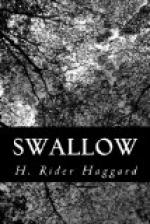Somehow I do not recollect much of the details of that wedding; they seem to have slipped my mind, or perhaps they are buried beneath the memories of all that followed hard upon it. I remember Suzanne standing before the little table, behind which was the predicant with his book. She wore a white dress that fitted her very well, but had no veil upon her head after the English fashion, which even Boer girls follow nowadays, only in her hand she carried a bunch of rare white flowers that Sihamba had gathered for her in a hidden kloof where they grew. Her face was somewhat pale, or looked so in the dim room, but her lips showed red like coral, and her dark eyes glowed and shone as she turned them upon the lover at her side, the fair-haired, grey-eyed, handsome English lad, whose noble blood told its tale in every feature and movement, yes, and even in his voice, the man whom she had saved from death to be her life-mate.
A few whispered words, the changing of a ring, and one long kiss, and these two, Ralph Kenzie and Suzanne Botmar, were husband and wife in the eyes of God and man. Ah! me, I am glad to think of it, for in the end, of all the many marriages that I have known, this proved the very best and happiest.
Now I thought that it was done with, for they had knelt down and the predicant had blessed them; but not so, for the good man must have his word, and a long word it was. On and on he preached about the duties of husbands and wives, and many other matters, till at last, as I expected, he came to the children. Now I could bear it no longer.
“That is enough, reverend Sir,” I said, “for surely it is scarcely needful to talk of children to people who have not been married five minutes.”
That pricked the bladder of his discourse, which soon came to an end, whereon I called to the Kaffirs to bring in dinner.
The food was good and plentiful, and so was the Hollands, or Squareface as they call it now, to say nothing of the Constantia and peach-brandy which had been sent to me many years before by a cousin who lived at Stellenbosch; and yet that meal was not as cheerful as it might have been. To begin with, the predicant was sulky because I had cut him short in his address, and a holy man in the sulks is a bad kind of animal to deal with. Then Jan tried to propose the health of the new married pair and could not do it. The words seemed to stick in his throat, for at the best Jan was never a speaker. In short, he made a fool of himself as usual, and I had to fill up the gaps in his head.
Well, I talked nicely enough till in an evil moment I overdid it a little by speaking of Ralph as one whom Heaven had sent to us, and of whose birth and parents we knew nothing. Then Jan found his tongue and said: “Wife, that’s a lie, and you know it,” for, doubtless, the Hollands and the peach-brandy had got the better of his reason and his manners. I did not answer him at the time, for I hate wrangling in public, but afterwards I spoke to him on the subject once and for all. Luckily, the predicant took no notice of this incident, for he was thinking about himself as he was too prone to do.




